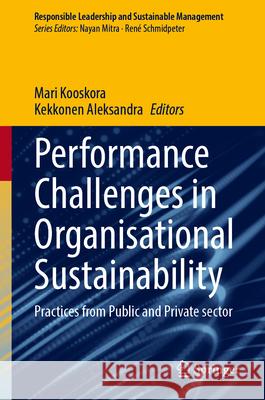Performance Challenges in Organizational Sustainability » książka
Performance Challenges in Organizational Sustainability
ISBN-13: 9789819755479 / Angielski / Twarda / 2024 / 275 str.
This book conceptualizes and clarifies the meaning of sustainable performance, approaching it holistically from different perspectives. It focuses on challenges related to movements to transform the world economy into more modern, resource-efficient, and competitive, while keeping in mind harmonization of environmental, social, and governance objectives. This has brought along new initiatives and undertakings that invite people, communities, and organizations to participate in building greener and more sustainable future. The book discusses the UN Sustainable Development Goals (SDGs), EU Green Deal and Climate Pact, and Environmental, Social and Governance (ESG) metrics. It tackles policies and strategies that integrate sustainable practices into business activities to align with these goals, focusing on the increasing number of regulations, such as ESG Reporting, Sustainable Finance Disclosure Regulation (SFDR), Corporate Sustainability Reporting Directive (CSRD), and Green Taxonomy. The book highlights new challenges organizations will face as they navigate their way through these goals and regulations, and provides practical coping tips.
It is divided into four main parts which consecutively discuss and analyze the concepts and approaches more generally in the first part, challenges, approaches, and metrics on green and sustainable performance on regional and local level in the second part; and on companies' level in the third part; and how top-down (public sector) and bottom-up (private sector) approaches meet. Finally, in the fourth part, the book showcases concrete cases and best practices related to the above-described topics showing how the challenges related to green and sustainable performance have been turned to new opportunities and competitive advantage in different organizations in different industries.
The book is a valuable resource for not only academia, researchers, master, and doctoral level students (especially in the sustainability courses), and executive trainings, but also practitioners, politicians, public officials, and organizational leaders interested in turning their organizations into more sustainable units.











